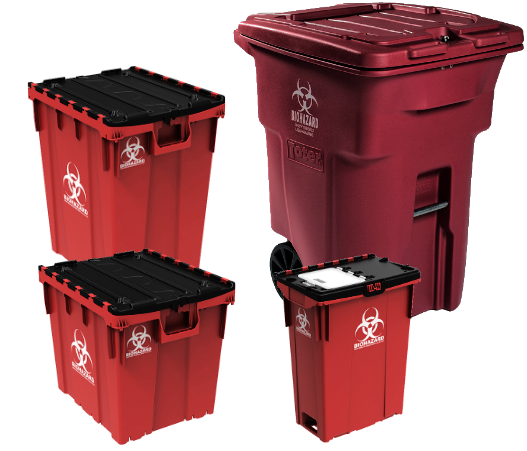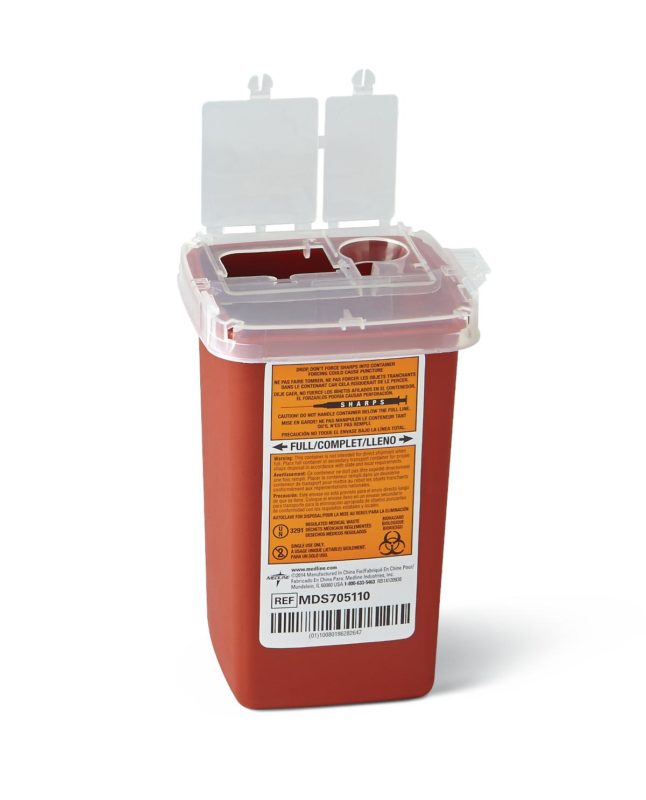Neighborhood Care: Smooth and Reliable Medical Waste Removal Near Me
Neighborhood Care: Smooth and Reliable Medical Waste Removal Near Me
Blog Article
Remain Compliant and Safe: Exactly How to Throw Away Medical Waste Appropriately
In today's ever-changing health care landscape, ensuring compliance and safety and security when it concerns medical waste disposal is of utmost significance. The correct monitoring and disposal of clinical waste not just protects the setting however also safeguards the health and wellness of medical care employees and the general public (medical waste disposal services with WasteX). However, navigating the complicated guidelines and guidelines surrounding clinical waste disposal can be a complicated task. In this discussion, we will certainly check out the various types of clinical waste, the connected threats, the legal requirements, and the most effective practices for preserving a secure and compliant clinical waste management system. Remain tuned to uncover the environment-friendly options that are reinventing the means clinical waste is taken care of, as we clarified this vital element of healthcare operations.
Relevance of Proper Medical Garbage Disposal
Proper medical waste disposal is of utmost relevance in ensuring the safety and health of both health care employees and the general public. Medical waste, that includes things such as utilized needles, infected dressings, and ran out medicines, poses severe health risks otherwise handled and dealt with properly.

Moreover, inappropriate disposal of clinical waste can lead to environmental contamination. When clinical waste is not set apart, treated, or disposed of appropriately, it can locate its way right into garbage dumps or bodies of water, potentially polluting the water, soil, or air sources. This can have harmful results on environments and human health and wellness, as hazardous materials may leach right into the environment or be released right into the ambience.
Types of Clinical Waste and Their Dangers
The varied series of medical waste generated by health care centers presents numerous risks that need to be meticulously addressed to make certain correct disposal and avoid potential damage to public health and the setting. Medical waste can be identified into various categories based upon its qualities and degree of risk.
One kind of medical waste is contagious waste, which includes products that are infected with blood or other potentially infectious materials. This can consist of used needles, syringes, and various other sharp things, in addition to cells, swabs, and dressings from clients with contagious diseases. Inappropriate disposal of infectious waste can cause the transmission of dangerous microorganisms and the spread of infections.
An additional category is harmful waste, which consists of materials that are hazardous, combustible, corrosive, or reactive. This can consist of chemicals, drugs, and certain medical gadgets. Messing up or inappropriate disposal of contaminated materials can lead to ecological contamination and posture risks to the health and wellness of waste employees and the public.
Contaminated waste is another sort of medical waste that need to be meticulously managed. This waste includes materials that consist of contaminated materials, such as made use of radiation treatment sources or contaminated laboratory materials. Incorrect handling or disposal of radioactive waste can cause radiation direct exposure and significant wellness threats.
Last but not least, non-hazardous basic waste, such as paper, product packaging products, and food waste, is additionally created by medical care centers. While this waste might not position substantial threats, it still needs to be appropriately managed to preserve cleanliness and avoid the attraction of insects.
To guarantee the risk-free disposal of clinical waste, health care centers should execute appropriate partition, treatment, storage, and transport techniques. This includes using suitable containers, labeling, and training for team, as well as following regional regulations and standards. By resolving the dangers connected with different kinds of medical waste, healthcare centers can safeguard public health and the setting.
Lawful and Regulatory Requirements for Disposal
In order to make certain the appropriate and safe disposal of clinical waste, health care centers need to follow lawful and regulatory needs. These requirements remain in place to shield public health and wellness resource and the setting from the prospective hazards connected with clinical waste. Medical waste is identified as a special category of waste as a result of its prospective to transmit infectious conditions and consist of damaging materials.

Some usual requirements include the partition and correct product packaging of medical waste, using authorized tags and containers, and the implementation of risk-free handling and transport treatments - medical waste removal. Healthcare facilities may likewise be called for to preserve documents of their waste monitoring techniques and provide documentation to regulative authorities upon request
Failure to follow these lawful and governing needs can cause fines, penalties, and reputational damages for health care centers. It is, as a result, essential for healthcare companies to focus on compliance and establish robust waste management protocols to guarantee the safe and proper disposal of clinical waste.
Ideal Practices for Safe Medical Waste Monitoring
Medical care facilities should follow industry ideal techniques to make certain the risk-free and efficient monitoring of clinical waste - medical waste disposal services with WasteX. Carrying out these best techniques not only assists protect the setting and public health yet also minimizes the risk of possible legal and economic consequences
Among the key finest techniques is the appropriate partition and containment of different kinds of clinical waste. This includes making use of color-coded containers and clearly identifying them to make certain that each type of waste my site is disposed of properly. In addition, healthcare facilities must have marked areas for storage and disposal of clinical waste, with clear standards and treatments in place.
One more vital aspect of safe medical waste administration is the training and education and learning of healthcare staff. All workers that take care of medical waste ought to get detailed training on the correct handling, storage space, and disposal treatments. It is essential to guarantee that employee are mindful of the possible threats associated with medical waste and are equipped with the required understanding and skills to handle it safely.
Routine tracking and auditing of waste administration methods is likewise vital. This includes consistently assessing waste monitoring treatments, performing examinations, and keeping precise records. By keeping an eye on waste administration methods, health care facilities can identify any possible concerns or locations for enhancement and take corrective actions as necessary.
Last but not least, medical care centers ought to prioritize the use of eco-friendly disposal techniques whenever possible. This includes making use of waste therapy innovations such as autoclaving or incineration, which can help in reducing the quantity and harmful nature of medical waste.
Eco-Friendly Solutions for Medical Waste Disposal
Applying green solutions for clinical garbage disposal is essential for healthcare centers to reduce ecological effect and ensure lasting methods. Typical techniques of medical garbage disposal, such as incineration and landfilling, have been located to release unsafe contaminants right into the air and infect soil and water resources. Because of this, there is an expanding need for different techniques that are both ecologically pleasant and safe.
These systems use advanced this content innovations to securely process medical waste within the health care center itself. By dealing with the waste on-site, transport emissions and dangers connected with off-site disposal are lowered.
Another environmentally friendly technique is the fostering of reusing programs for particular kinds of medical waste. Materials such as glass, plastics, and metals can be recycled as opposed to disposed of in garbage dumps. By carrying out partition and recycling programs, healthcare facilities can considerably minimize their waste quantity and lessen their ecological impact.
Moreover, medical care centers can check out using recyclable clinical devices and materials. By choosing recyclable products, rather than single-use alternatives, the amount of waste generated is considerably reduced. Reusable items can be decontaminated and made use of numerous times, causing expense savings and less ecological influence.
Verdict
Finally, correct disposal of clinical waste is vital for preserving compliance and ensuring safety and security. Comprehending the kinds of medical waste and their linked dangers is crucial in order to execute the appropriate disposal approaches. Adhering to regulative and legal needs is necessary for preventing penalties and securing the atmosphere. Adhering to finest practices for secure clinical waste management and discovering environmentally friendly solutions can add to a accountable and sustainable strategy to squander disposal in the medical care market.
In this discussion, we will certainly explore the different kinds of medical waste, the connected threats, the legal demands, and the ideal practices for maintaining a safe and compliant medical waste monitoring system - medical waste removal near me.One kind of clinical waste is infectious waste, which includes things that are polluted with blood or various other possibly transmittable products.Radioactive waste is another type of medical waste that need to be carefully managed. Clinical waste is categorized as an unique group of waste due to its potential to transfer contagious illness and have hazardous substances
Complying with ideal techniques for secure clinical waste monitoring and discovering eco-friendly solutions can contribute to a liable and lasting strategy to throw away disposal in the medical care sector. medical waste disposal services with WasteX.
Report this page